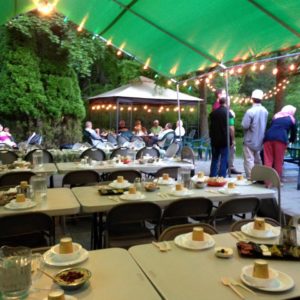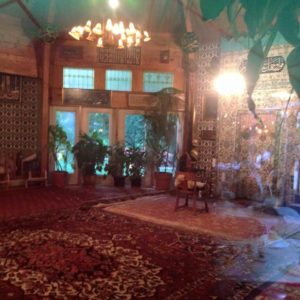

 Last Sunday, Muslims celebrated the end of Ramadan, the month of fasting. I remember as the month approached I was worried how I would keep the long 16 hour fasts, which required getting up at 3am to eat something, sleeping at 4am after prayers, and then not having any food – not even water- until sunset at 8:30 pm or so. I talked to my Sufi friend Su Bulut, and shared my worries. She explained that if fasting is a burden then I am missing the point of fasting. To her, she felt it was an act of gratitude and connection to our Creator, who gives us everything every minute of the day, and by engaging in this self-restraint, we can feel closer to our Creator. As I was not working full-time anymore, I decided to give it a sincere try this year, and managed to keep 20 or so out of 30 fasts surprisingly. When the grandkids were over I did not fast…I did not want to be grumpy, or weak, or distracted. Even on those days, I did not eat much as if to be one with the community, and to practice negating the self and its needs and greed. And I continued to be in amazement at some of my closest relatives and friends, e.g. my husband Shahid, my daughter-in-law Amna, her mom Fauzia Syed, and my friend Nuzzo Iqbal, etc. who kept all fasts steadfastly!
Last Sunday, Muslims celebrated the end of Ramadan, the month of fasting. I remember as the month approached I was worried how I would keep the long 16 hour fasts, which required getting up at 3am to eat something, sleeping at 4am after prayers, and then not having any food – not even water- until sunset at 8:30 pm or so. I talked to my Sufi friend Su Bulut, and shared my worries. She explained that if fasting is a burden then I am missing the point of fasting. To her, she felt it was an act of gratitude and connection to our Creator, who gives us everything every minute of the day, and by engaging in this self-restraint, we can feel closer to our Creator. As I was not working full-time anymore, I decided to give it a sincere try this year, and managed to keep 20 or so out of 30 fasts surprisingly. When the grandkids were over I did not fast…I did not want to be grumpy, or weak, or distracted. Even on those days, I did not eat much as if to be one with the community, and to practice negating the self and its needs and greed. And I continued to be in amazement at some of my closest relatives and friends, e.g. my husband Shahid, my daughter-in-law Amna, her mom Fauzia Syed, and my friend Nuzzo Iqbal, etc. who kept all fasts steadfastly!
What was more surprising was that the intention I set made all the difference. I did not feel hungry, not even thirsty most days, and even went to the gym several times. Every evening we went to Jerrahi Mosque nearby to open fast in a communal fashion with the member community, and stayed for late prayers until 11pm. It was the most beautiful spiritual experience, and for the first time, I appreciated the transformation that Ramadan makes possible. It focuses us on the good, on gratitude, on others who are hungry and do not have the guarantee of a meal at the end of a day even. It detaches us from material things, and makes us realize the transience of everything.
As we entered the last 10 days of Ramadan, the prayers intensified. There was a sweetness in the air, as if we all had tasted the Divine by not tasting anything all day. I cannot explain it, but the ability to deny the ego, the nafs as sufis call it, is incredibly strengthening for the spirit. There is a knowing that there is a world beyond all these material things, and for a brief moment we connect to it. And when Eid is over, and the guests have gone, it is time to mine all that hard work and re-examine your character. What bad habits will I stay away from? What good habits will I build? How will I be more compassionate and caring towards all? How will I be more grateful for all that I have and focus on the good? How will I deal with evil and hate and violence? These questions remain, and in their questioning we continue to polish our character, if we hang on to the lesson of Ramadan.

Be First to Comment